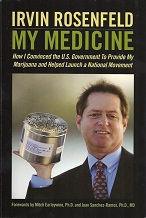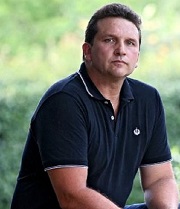New clinical study; cannabis is a safe and effective treatment for the symptoms of Alzheimer’s Disease
It's no wonder the pharmaceutical companies want to get in on the medical cannabis gold rush, it seems to have efficacy for or all sorts of illnesses.
One of the latest is the following study by an Israeli team of scientists and cannabis's medicinal benefits for those suffering dementia.
Safety and Efficacy of Medical Cannabis Oil for Behavioral and Psychological Symptoms of Dementia: An-Open Label, Add-On, Pilot Study.
Shelef A1, Barak Y1, Berger U2, Paleacu D1, Tadger S1, Plopsky I1, Baruch Y1.
Author information
1Abarbanel Mental Health Center, Bat-Yam, Israel and Sackler Faculty of Medicine, Tel-Aviv University, Tel-Aviv, Israel.
2Department of Psychology, Bar-Ilan University, Ramat-Gan, Israel.
Abstract
BACKGROUND:
Tetrahydrocannabinol (THC) is a potential treatment for Alzheimer's disease (AD).
OBJECTIVE:
To measure efficacy and safety of medical cannabis oil (MCO) containing THC as an add-on to pharmacotherapy, in relieving behavioral and psychological symptoms of dementia (BPSD).
METHODS:
Eleven AD patients were recruited to an open label, 4 weeks, prospective trial.
RESULTS:
Ten patients completed the trial. Significant reduction in CGI severity score (6.5 to 5.7; p < 0.01) and NPI score were recorded (44.4 to 12.8; p < 0.01). NPI domains of significant decrease were: Delusions, agitation/aggression, irritability, apathy, and sleep and caregiver distress.
CONCLUSION:
Adding MCO to AD patients' pharmacotherapy is safe and a promising treatment option.
KEYWORDS:
Alzheimer’s disease; behavioral and psychological symptoms of dementia; cannabis; tetrahydrocannabinol
reference: http://www.ncbi.nlm.nih.gov/pubmed/26757043
The problem is that the only way these pharmaceutical companies can really profit from cannabis is to synthesis it, and this can lead to severe consequences! as the following article demonstrates.
Drug company apologises after death of man left brain-dead in French trial
The private laboratory Biotrial was testing a new pain and mood disorder medication for Portuguese pharmaceutical company Bial on humans for the first time, in what is known as a Phase I trial, to test the drug's safety.
A total of 108 volunteers took part in the trial, 90 of whom received the drug at varying doses, while the rest were given placebos.
The six men who were hospitalised were the group which received the highest dose.
Bial chief executive Antonio Portela said he was "profoundly shocked by the situation" according to Portuguese news service LUSA.
"On my behalf and the behalf of Bial, I would like to express my deepest apologies to the family of the volunteer who died after participating in the Phase I trial of our experimental molecule," he said.
Mr Portela said Bial staff in France and Portugal were "working tirelessly to understand the causes of this accident".
Pierre-Gilles Edan, head of the neurology department at the Rennes hospital, said that three of the men were suffering a "handicap that could be irreversible" and another also had neurological problems.
The sixth volunteer had no symptoms but was being monitored.
"The 84 other volunteers exposed to the drug [have been contacted]," the hospital said.
Ten of them came in to be examined and did not have the "anomalies" seen in the hospitalised patients.
The incident is the worst of its kind ever to have taken place in France, which has launched three separate probes to determine whether the tragedy was caused by an error in the trial's procedures or in the substance tested.
Bial is cooperating with the investigation and vows it followed "international best practice" in developing the drug.
Biotral, the private laboratory administering the trial, said in a statement that it planned to work with the international scientific community to develop "changes to the standards governing such trials", without giving further details.
The company said the situation was "even more upsetting given that there is as yet no explanation".
Previous testing, notably on animals, had not thrown up any unusual results.
Other drug trial participants 'damaged for life'
Such serious mishaps are rare during the development of a drug, which begins in the laboratory before being animal tested and then three phases of human trials before it can be brought to market.
France's public body ONIAM, which is responsible for compensating the victims of medical accidents, said it had in its files only around 10 cases of accidents during drugs trials over the past 15 years, and "with consequences infinitely less serious" than the case in Rennes.
Although a rarity, there have been precedents in other countries.
A comparable accident took place in 2006 in London when six people taking German drug manufacturer TeGenero's TGN1412, which it was developing to treat certain types of cancer and other immunological diseases, fell seriously ill, with one suffering from multiple organ failure.
Two of the volunteers were in a critical condition and one lost all his fingers and toes.
The victims said they had the impression that their brains were on fire and that their eyes were coming out of their sockets.
Although they all survived, experts said at the time that their immune systems would be damaged for life.
reference: AFP
Considering the fact that no one has reportedly died from using cannabis, do we really need to synthesis this amazingly versatile plant, or would we prefer the pharmaceutical company stay away and let nature provide an organic version?
Macedonia is set to become the 14th country in Europe to leagalise medical cannabis
The public debate regarding the legalization of marijuana for medical purposes has ended and the law is expected to be approved by the parliament, by the end of February.
This way, Macedonia is set to become the 14th country in Europe that uses it for medical treatment to people suffering from serious illnesses. The law foresees for the market to have 3 kinds of produce.
Oil with no more than 0.2 % THC, more than 0.2 percent and another one found in the European market. Experts say that this will help patients treat illnesses, as a lot of marijuana is found in the black market, sold at a high price, but there is also the risk for patients not to be aware of the oil quality.
For the law, ministry of health consulted experts, specialist doctors from various fields, pharmacologists and representatives of civil society.
A recent opinion poll suggested that 70 per cent of Macedonians support allowing the use of marijuana products for the treatment of cancer and other serious diseases.
Studies have shown that it helps patients in reducing pain, but it needs to be proven that it has an anti-tumour effect.
reference:http://english.albeu.com/news/news/macedonia-to-legalize-medical-marijuana/226941/
Italy chills out over medical cannabis cultivators
ROME - Italy eased up slightly on cannabis growers Friday, decriminalizing those who violate agreed terms on cultivating the plants for therapeutic purposes.
"This does not decriminalize those growing weed on their terrace," warned Justice Minister Andrea Orlando. Under the new bill, people who abuse their permission to cultivate cannabis will be slapped with a fine rather than a prison sentence.
Those caught growing their own personal crop without a license still face up to a year in jail and a four-million euro fine.
The aim is to help ease Italy's notoriously congested justice system and "make sanctions more effective", Orlando said.
In July, over 200 parliamentarians from across the political spectrum submitted a bill to legalize the cultivation of a small amount of cannabis for personal recreational use.
One company, betting on cannabis use becoming legal for all in Italy by the end of the year, launched a website this week to recruit people interested in the idea of setting up a franchised shop.
Nativa said Italians consume "some three million kilograms of cannabis a year" -- grounds for a potentially rich business.
reference:
http://www.interaksyon.com/article/122806/italy-chills-out-over-medical-cannabis-cultivators
The interim period of medical cannabis in Australia
In the interim period whilst medical cannabis is still illegal, the Australian government has said it would be lenient to patients in need and not prosecute them for using cannabis as a last hope for their survival.
But at the same time they bust the suppliers/growers of the cannabis, this seems hypocritical to me and also very detrimental to a dying person.
Latest
Coronavirus Strikes Massachusetts Cannabis Company Employees
Reassessing the Essential: Cannabis in the Time of a Pandemic
5 Reasons To Try Aspen Valley CBG Flower (30% Off)
High Times Cannabis Cups Go Virtual In Wake Of Coronavirus Pandemic
Drug Enforcement Administration Proposes Plan To Expand Cannabis Research
Ghana Legalizes Cannabis For Medicinal And Industrial Uses
The cheapest legal weed in Canada: Discover these cannabis ‘value brands’
Cannabis and coronavirus: Here’s what you need to know
cannabis designs
The Best Of
WHO Rules CBD Should Not Be a Scheduled Drug

Dr Cristina Sanchez PhD video interview on medical marijuana and cancer

Biochemist Dennis Hill interview; Cannabis oil as a cure for cancer.

The unofficial World Record holder for cannabis smoking part 1








